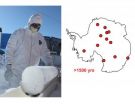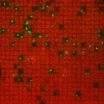(Press-News.org) Researchers from DTU Systems Biology have mapped 500 previously unknown microorganisms in human intestinal flora as well as 800 also unknown bacterial viruses (also called bacteriophages) which attack intestinal bacteria.
To map the microorganisms, the researchers have developed a new principle for analysing DNA sequence data, which they have named the co-abundance principle. A principle which basically assumes that different pieces of DNA from the same organism will occur in the same amount in a sample, and that this amount will vary over a series of samples.
"Using our method, researchers are now able to identify and collect genomes from previously unknown microorganisms in even highly complex microbial societies. This provides us with an overview we have not enjoyed previously," says Professor Søren Brunak who has co-headed the study together with Associate Professor Henrik Bjørn Nielsen.
So far, 200-300 intestinal bacterial species have been mapped. Now, the number will be more than doubled, which could significantly improve our understanding and treatment of a large number of diseases such as type 2 diabetes, asthma and obesity.
Viruses—not antimicrobial agents.
The two researchers have also studied the mutual relations between bacteria and viruses.
"Our study tells us which bacterial viruses attack which bacteria, something which has a noticeable effect on whether the attacked bacteria will survive in the intestinal system in the long term," says Henrik Bjørn Nielsen
Previously, bacteria were studied individually in the laboratory, but researchers are becoming increasingly aware that in order to understand the intestinal flora, you need to look at the interaction between the many different bacteria found.
And when we know the intestinal bacteria interactions, we can potentially develop a more selective way to treat a number of diseases.
"Ideally we will be able to add or remove specific bacteria in the intestinal system and in this way induce a healthier intestinal flora," says Søren Brunak.
It is particularly interesting in relation to the increasing problem of antimicrobial resistance which many consider a real threat to global health.
"We have previously been experimenting with using bacteria and viruses to fight disease, but this was shelved because antimicrobial agents have been so effective in combating many infectious diseases. If we can learn more about who attacks who, then bacterial viruses could be a viable alternative to antimicrobial agents. It is therefore extremely important that we now can identify and describe far more relations between bacteria and the viruses that attack them," says Henrik Bjørn Nielsen.
INFORMATION:
The research findings will be published in Nature Biotechnology.
Researchers uncover new knowledge about our intestines
2014-07-06
ELSE PRESS RELEASES FROM THIS DATE:
'Nanojuice' could improve how doctors examine the gut
2014-07-06
BUFFALO, N.Y. – Located deep in the human gut, the small intestine is not easy to examine. X-rays, MRIs and ultrasound images provide snapshots but each suffers limitations.
Help is on the way.
University at Buffalo researchers are developing a new imaging technique involving nanoparticles suspended in liquid to form "nanojuice" that patients would drink. Upon reaching the small intestine, doctors would strike the nanoparticles with a harmless laser light, providing an unparalleled, non-invasive, real-time view of the organ.
Described July 6 in the journal Nature Nanotechnology, ...
Discovery provides insights on how plants respond to elevated CO2 levels
2014-07-06
Biologists at UC San Diego have solved a long-standing mystery concerning the way plants reduce the numbers of their breathing pores in response to rising carbon dioxide levels in the atmosphere.
In a paper published in this week's early online edition of Nature, they report the discovery of a new genetic pathway in plants, made up of four genes from three different gene families that control the density of breathing pores—or "stomata"—in plant leaves in response to elevated CO2 levels.
Their discovery should help biologists better understand how the steadily increasing ...
Rewriting the history of volcanic forcing during the past 2,000 years
2014-07-06
RENO – A team of scientists led by Michael Sigl and Joe McConnell of Nevada's Desert Research Institute (DRI) has completed the most accurate and precise reconstruction to date of historic volcanic sulfate emissions in the Southern Hemisphere.
The new record, described in a manuscript published today in the online edition of Nature Climate Change, is derived from a large number of individual ice cores collected at various locations across Antarctica and is the first annually resolved record extending through the Common Era (the last 2,000 years of human history).
"This ...
Global toolkit to diagnose menopause
2014-07-06
Created at Monash University, the world's first toolkit is designed for GPs to use with women from the age of 40. Thought to be the first of its kind, researchers say the toolkit has the potential to help manage menopausal conditions for women globally.
The Practitioner Toolkit for Managing the Menopause, which includes a diagnostic tool, as well as a compendium of approved hormone therapies, is published today in the journal, Climacteric.
Led by Professor Susan Davis, the research team from the School of Public Health and Preventative Medicine, combined existing research ...
The Lancet: Sierra Leone researchers call for improved health surveillance and communication around Ebola crisis
2014-07-05
Researchers working in Sierra Leone today [Saturday 5 July] suggest priority actions needed to tackle the ongoing Ebola crisis in West Africa. In a letter to The Lancet, the researchers call for improvements in access to diagnostic technologies and health-care resources, as well as improved disease surveillance and health communication.
At present, there is little incentive for patients to seek professional diagnosis of suspected Ebola, say the authors, with most people with febrile (fever-causing) illnesses in Sierra Leone treated at home, and the true extent of the ...
The Lancet: New trial suggests cheaper drugs for common heart attack procedure could improve outcomes and save health budgets millions
2014-07-05
A new study published in The Lancet compares outcomes for two drugs used to prevent blood clot formation during emergency heart attack treatment. The study suggests that use of one of the drugs, heparin, could result in improved outcomes (such as a reduced rate of repeat heart attacks), compared to the other drug tested, bivalirudin, which is in widespread use in high-income countries, and is around 400 times more expensive than heparin.
The results of the HEAT-PPCI trial suggest that systematic use of heparin rather than bivalirudin after primary percutaneous coronary ...
Association found between high cholesterol and breast cancer
2014-07-04
This news release is available in Spanish.
Barcelona, 4 July 2014: An association between high blood cholesterol and breast cancer has been found in a study of more than 1 million patients over a 14 year time period in the UK. The research will be presented today at Frontiers in CardioVascular Biology (FCVB) 2014 in Barcelona, Spain. The meeting is organised by the Council on Basic Cardiovascular Science of the European Society of Cardiology (ESC) in collaboration with 13 European cardiovascular science societies.
http://spo.escardio.org/SessionDetails.aspx?eevtid=65&sessId=13301&subSessId=3494
Dr ...
First evidence for painless atrial fibrillation treatment
2014-07-04
Barcelona, 4 July 2014: The first evidence for a shockless treatment for atrial fibrillation (AF) will be presented today at Frontiers in CardioVascular Biology (FCVB) 2014 in Barcelona, Spain. The meeting is organised by the Council on Basic Cardiovascular Science of the European Society of Cardiology (ESC) in collaboration with 13 European cardiovascular science societies. http://spo.escardio.org/SessionDetails.aspx?eevtid=65&sessId=13104
Dr Brian O. Bingen, first author, said: "AF is the most common cardiac arrhythmia. Symptoms range from the feeling of fish flapping ...
Effects of conflict on women's reproductive health need to be managed sensitively
2014-07-04
Clinicians need to be sensitive and aware of the unique challenges of women's reproductive health needs in times of conflict, suggests a new review published today (4 July) in The Obstetrician & Gynaecologist (TOG).
Approximately 1.5 billion people are currently living in countries affected by conflict, fragility or large-scale violence. Women and children account for approximately 75% of those displaced by conflict and roughly 20% of those displaced are women of reproductive age and one in five will be pregnant.
This new review looks at how conflict can negatively ...
New discovery in living cell signaling
2014-07-03
A breakthrough discovery into how living cells process and respond to chemical information could help advance the development of treatments for a large number of cancers and other cellular disorders that have been resistant to therapy. An international collaboration of researchers, led by scientists with the U.S. Department of Energy (DOE)'s Lawrence Berkeley National Laboratory (Berkeley Lab) and the University of California (UC) Berkeley, have unlocked the secret behind the activation of the Ras family of proteins, one of the most important components of cellular signaling ...




